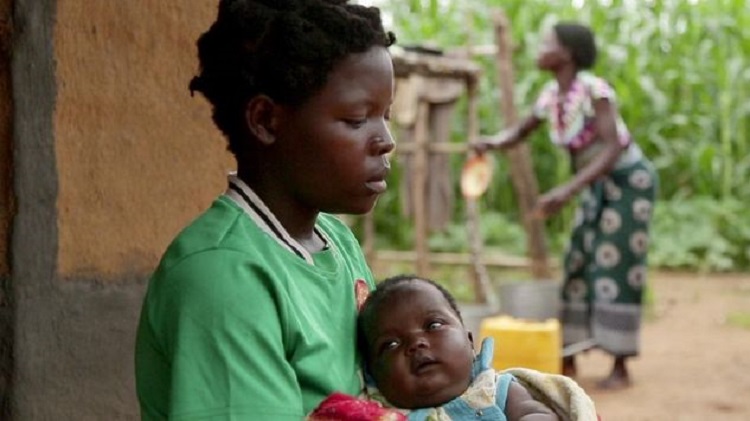According to a report released by UNICEF, an estimated 125 million African girls are child brides. That number is expected to rise to 310 million by 2050, creating a legacy of “lost childhoods and shattered futures.” UNICEF has demanded that governments take more aggressive actions to end the practice on the continent.
Across Africa girls are being married off to pay family debts, to keep them supposedly free of sin, or simply because it’s tradition. But the lives of these child brides are ones of violence, poverty and increased risk of HIV.
Karabo Ozah, an attorney at the Centre for Child Law in Pretoria says that currently there is a seven percent prevalence of child marriages in South Africa, although that number could be higher. But compared to the rest of Africa, South Africa sits in a low percentile.
“Compared to the rest of Africa child marriages in SA is not that high, some countries in Africa has it at 60 perfect and going up not even declining,” Ozah explained.
Child marriage does not constitute a single rights violation; rather, every instance of child marriage triggers a continuum of violations that continues throughout a girl’s life. Child marriage endangers the survival and well-being of women and girls by exposing them to forced initiation into sex and ongoing sexual violence, as well as to early, unplanned, and frequent pregnancies.
Furthermore, women and girls married as children are often denied educational opportunities, are isolated from society, and face a lifetime of economic dependence.
Ozah says that issues of culture and issues of poverty are some of the forces that drive people off into marrying off their children.
“In South Africa we have had three recent incidents; one was in KwaZulu-Natal where parents received live stock for the child. So they saw livestock as a way of coming out of poverty,” Ozah went further.
“There was a similar case in Mpumalanga where parents received money and married off their young child to a man over the age of 60. Last year the Cape Town high court saw a case where the uncles of a young girl received about R8000 for marrying off his 14 year old niece.”
As is the case for many child brides, beatings and rape were common in this girl’s new marital home. After a number of failed escape attempts, the young bride finally made it over a fence and ran to the nearest police station. She then filed charges for the case that would become the first criminal prosecution of child marriage in South Africa.
“So poverty is being identified not only in South Africa but in many African countries as the push factor where families marry off their young children, thus it is not only the cultural factor alone,” Ozah continued.
Together, child marriage and early pregnancy trap generations of women in cycles of poverty. These harms result in significant violations of girls’ rights, including their reproductive rights and their right to freedom from gender-based violence. Ensuring accountability for child marriage entails both holding responsible those officials who have failed to implement laws and policies against the practice, and addressing legal and social barriers that prevent married girls seeking to leave such marriages from being able to do so. It also requires the introduction of specific legal measures and remedies to address the particular needs of married girls.
In South Africa, under the customary law there is no specific age of consent to be married.
“The challenge is the fact that the age of consent to be married is very unclear and very conflicting, both under customary law and under the marriages act,” Ozah expressed.
“The government set the age of consent for girls at a minimum age of 14 and under customary law at 18, however if you are under the age of 18 then your parents can consent on your behalf and the minister can constant etc then there is no absolute minimum and those are the gaps that create space for practices like Ukuthwalwa to be practiced in relation to children.”
Ukuthwalwa is the practice of abducting young girls and forcing them into marriage, sometimes with the consent of their parents or guardians. The practice occurs mainly in rural parts of South Africa and the girls who are involved in this practice are frequently under-aged.
“One of biggest issues not only in South Africa but in all the other African countries is if we set the age of marriage to the age of 18 then what we do is have other provisions for children to marry under the age of 18 and that’s clearly against the African charter.”
“So we need to set the age of marriage at 18 and nothing below that should be acceptable,” Ozah added.
The South African law commission has made recommendations for criminalising people who marry off their children, however according to Ozah those recommendations have not as yet been implemented.
“Our Children’s Act has a provision that is aimed at protecting children from being given out in marriage, but the challenge again is the issue of age because what it says is that a child below the minimum age of marriage may not be given out in marriage, but minimum becomes complicated when you start looking at the different pieces of legislation and the fact that there is no absolute minimum.”
“All our laws need to be harmonised with regards to the age of consent of marriage under customary law under the marriages act the age must be 18 without exception as a start,” Ozah added.
Furthermore, Ozah says that in rural communities people tend to not speak out against people who commit these types of offences. Thus even if the law does change, communities would still need to become aware of these issues.
“We need to work in these communities to sensitise people about the negative outcomes of early marriage.” VOC (Umarah Hartley)






 WhatsApp us
WhatsApp us 

